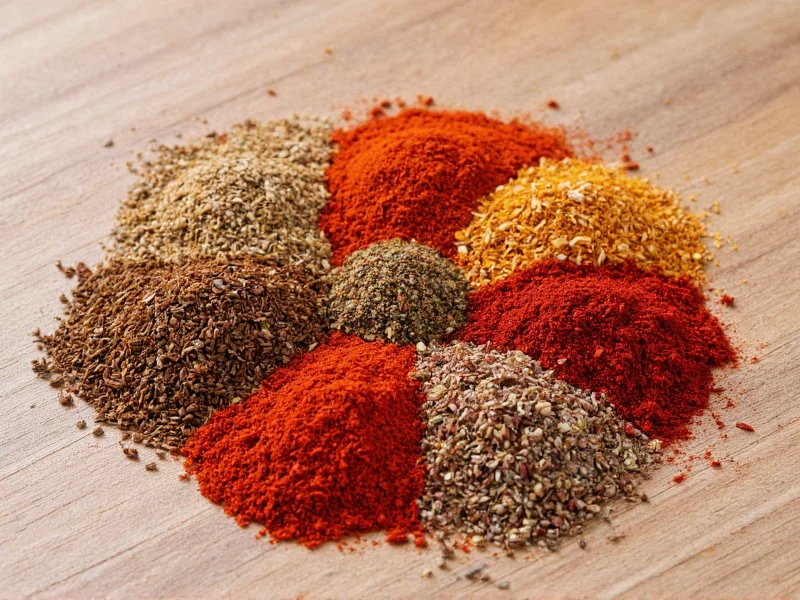Building a well-stocked spice cabinet transforms ordinary cooking into extraordinary culinary experiences. Understanding which spices deserve permanent residency in your kitchen pantry helps streamline meal preparation while elevating flavors. This guide explores the essential spices that form the backbone of home cooking, their distinctive characteristics, and practical applications that make them indispensable in daily meal preparation.
Essential Spices for Every Home Kitchen
Every well-equipped kitchen relies on a core collection of versatile spices. These fundamental ingredients provide the flavor foundation for countless recipes across global cuisines. The following spices represent the most frequently used in households worldwide, chosen for their versatility, shelf stability, and culinary importance.
| Spice | Flavor Profile | Primary Culinary Uses | Storage Duration |
|---|---|---|---|
| Salt | Savory, mineral | Universal seasoning, flavor enhancer | Indefinite |
| Black Pepper | Pungent, slightly floral | Meats, vegetables, sauces, soups | 2-3 years |
| Paprika | Sweet, earthy, smoky | Stews, rubs, deviled eggs, goulash | 1-2 years |
| Cumin | Earthy, warm, slightly citrusy | Tacos, chili, curries, roasted vegetables | 1-2 years |
| Cinnamon | Sweet, warm, woody | Baking, oatmeal, apple dishes, mulled beverages | 1-2 years |
Understanding Spice Flavor Profiles and Applications
Each common household spice brings distinctive characteristics that transform simple ingredients into complex dishes. Black pepper's pungency enhances savory dishes without overwhelming other flavors, making it the perfect companion to salt in virtually all cuisines. Paprika's versatility ranges from sweet Hungarian varieties to smoky Spanish versions, each serving different culinary purposes in everyday cooking.
Cumin stands as one of the most widely used spices globally, essential for creating authentic Mexican, Indian, and Middle Eastern dishes. Its distinctive earthy flavor forms the backbone of chili, curry, and taco seasoning blends. Cinnamon transcends its sweet applications, adding depth to savory Moroccan tagines and Middle Eastern rice dishes when used judiciously.
Optimal Storage Practices for Common Spices
Proper storage significantly extends the shelf life and maintains the potency of your essential spices for home cooking. Exposure to light, heat, and moisture rapidly degrades spice quality. Store spices in airtight containers away from direct sunlight and heat sources like stoves or dishwashers. Whole spices generally maintain freshness longer than ground versions—consider investing in a small grinder for whole peppercorns, cumin seeds, and cinnamon sticks when possible.
Most ground spices retain optimal flavor for 1-2 years, while whole spices can last 2-3 years. Salt and sugar remain stable indefinitely when kept dry. To test spice freshness, rub a small amount between your fingers and smell—if the aroma is weak or musty, it's time for replacement. Properly stored spices maintain their vibrant colors and robust flavors essential for everyday cooking.
Practical Substitutions for Missing Spices
Every home cook occasionally discovers they're missing a required spice. Understanding basic substitutions prevents recipe disasters while maintaining flavor integrity. No cumin? Try a combination of equal parts coriander and chili powder. Missing oregano? Marjoram makes an excellent substitute with similar earthy notes. Without paprika, a pinch of cayenne pepper mixed with a touch of sweet red pepper puree can approximate its flavor profile.
When substituting cinnamon in baking, consider apple pie spice (which contains cinnamon) or a combination of nutmeg and allspice. For garlic powder, fresh minced garlic works but use approximately three times the amount since fresh garlic contains moisture. These practical substitutions for common household spices ensure your cooking continues uninterrupted while maintaining acceptable flavor profiles.
Building a Versatile Spice Collection
Start with the foundational spices every kitchen needs before expanding into more specialized varieties. A basic collection should include salt, black pepper, garlic powder, onion powder, paprika, cumin, oregano, and cinnamon. As your cooking repertoire grows, gradually add supporting spices like turmeric, coriander, and cardamom based on the cuisines you prepare most frequently.
Purchase spices in small quantities from stores with high turnover to ensure freshness. Specialty spice shops and online retailers often provide superior quality compared to standard grocery stores. Consider buying whole spices and grinding them yourself for maximum flavor impact in your daily cooking. Organize your spice collection alphabetically or by cuisine type to streamline meal preparation and encourage regular use.
Frequently Asked Questions
How can I tell if my spices have gone bad?
Spices don't technically spoil but lose potency over time. Check freshness by rubbing a small amount between your fingers and smelling it. If the aroma is weak or musty, or if the color has significantly faded, it's time to replace them. Most ground spices maintain optimal flavor for 1-2 years when stored properly.
What's the difference between paprika and chili powder?
Paprika is made solely from ground peppers and ranges from sweet to smoked varieties. Chili powder typically contains paprika plus other spices like cumin, garlic powder, and oregano. For authentic recipes, use paprika when the recipe specifically calls for it, as chili powder's additional ingredients can alter the intended flavor profile.
Should I buy whole spices or ground spices?
Whole spices generally maintain freshness longer—up to 2-3 years compared to 1-2 years for ground versions. Invest in a small spice grinder for whole peppercorns, cumin seeds, and cinnamon sticks when possible. For frequently used spices like garlic powder or onion powder, ground versions offer convenience without significant quality loss.
What are the most versatile spices for beginner cooks?
Salt, black pepper, garlic powder, onion powder, paprika, and cumin form the most versatile foundation for beginner cooks. These essential spices for home cooking work across multiple cuisines and can transform simple ingredients into flavorful meals. Master these before expanding to more specialized spices based on your preferred cooking styles.
Can I use dried herbs instead of fresh in recipes?
Yes, but use one-third the amount of dried herbs compared to fresh, as drying concentrates their flavor. Dried oregano, basil, and thyme work well in cooked dishes like soups, stews, and sauces. Reserve fresh herbs for garnishes or dishes with minimal cooking time to preserve their delicate flavors.











 浙公网安备
33010002000092号
浙公网安备
33010002000092号 浙B2-20120091-4
浙B2-20120091-4